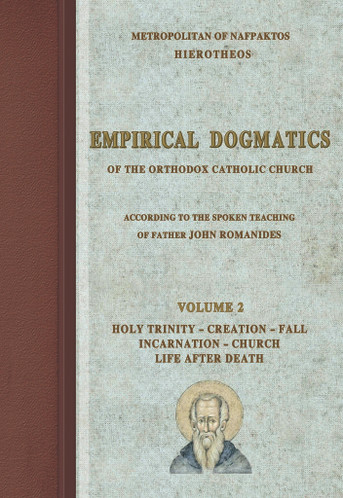The Church’s teaching on the Holy Trinity distinguishes between the dogma of the Holy Trinity, which it is possible to understand, and the mystery of the Holy Trinity, which defies human comprehension. The revelation of the Holy Trinity begins in the Old Testament: “It is Christ Who appears to the Prophets…Christ…is the Angel of the Lord, the Lord of Glory, Yahweh, the Lord Sabaoth, the Angel of Great Counsel …”
Fr. John reviews the scriptural and patristic teaching on the Creation of the World from non-being. Discussing the Demons of Darkness, he states uncompromisingly: “Being a theologian means first and foremost that someone is an expert in the wiles of the devil.” God’s personal direction of world is a matter of experience: “When someone is in the state of illumination he…sees the uncreated energy of God within creation.”
Commenting on the Creation of Man, Fr. John declares that we all possess a noetic faculty (nous) “which is supposed to be in man’s heart, but it is not in the heart when it is not functioning correctly”. The illuminated nous returns to the heart and prays: “When man prays with his rational faculty, that is human prayer…When, however, his nous prays within the heart, then the Spirit is praying.”
The Fall of Man does not mean “inheriting the guilt of Adam and Eve. The ancestral sin was not an affront to God, but a sickness of man.” Fr. John argues against St Augustine’s view that death is “a punishment from God” and sets out the evidence that it is an illness.
The Incarnation of the Son and Word of God is not just a historical event but “a spiritual event that is confirmed by empirical knowledge”. Analysing the Transfiguration of Christ, Fr. John comments: “We also know these things from the experience of glorification, not simply from reading Holy Scripture.” Christians must personally experience the Mystery of the Cross and Resurrection of Christ. “God is not reconciled with man, but man with God through the mystery of the Cross, and through this reconciliation man is transformed from an enemy of God into His friend, and participates in the Resurrection of Christ.”
The Mystery of Pentecost shows that the experience of Pentecost is repeated through the centuries. Fr. John stresses the empirical element of St Paul’s teaching: “For someone to be a temple of the Holy Spirit is an experience. If one reads the Apostle Paul carefully, he is not using empty words every time he describes the Holy Spirit…Who prays in man’s heart…This is the reality.” He also asks: “Without becoming a temple of the Holy Spirit, how can anyone become a theologian?”
Fr. John says characteristically: “What is the purpose of Orthodoxy? It is clear from the calendar of feasts. We have Easter and we have Pentecost. Baptism in water takes place at Easter. Baptism in the Holy Spirit takes place at Pentecost… And what is the outcome? The Sunday of All Saints. In other words, that all Orthodox Christians may be numbered among the saints.”
The Spiritual Perfecting of Christians analyses the stages of purification, illumination and glorification-theosis. Purification is not just a matter of avoiding sin: “Purification of the heart means that thoughts leave the heart…so that the heart is left…with one thought, prayer alone. This…is called prayer of the heart or single-thought prayer.” Those who reach illumination experience this: “Noetic prayer is a gift from God and is proof that somebody has become a temple of the Holy Spirit.” And someone who is glorified “no longer knows God in prophecies and knowledge and prayers, but knows Him directly.
Fr. John takes a historical and spiritual approach to the Mysteries (Sacraments) of the Church, stating: “The Mystery of Chrismation was intended for those who had already become members of the Body of Christ, because it was assumed that the Holy Spirit had already come to them and was praying in their heart.” Heresies and Councils are seen in a therapeutic perspective: “There is no therapeutic treatment in heresy…it is dangerous for people. The Fathers saw heresy as a form of charlatanism…”
Considering Life after Death, Fr. John stresses that Paradise and Hell exist from the human point of view, not from God’s perspective. “Someone who is suitably prepared sees God as glory, and someone else, who is unprepared, who does not have repentance and does not have divine vision, also sees God, but sees Him as ‘a consuming fire’. This is the fire of Hell.”
Metropolitan Hierotheos arranges all this material clearly and systematically, and links it with his own interpretative and critical comments. The resulting account of Empirical Dogmatics is comprehensive and compelling, with many surprises. This book will appeal not only to theologians but to anyone interested in what Orthodox Christians believe and why.




